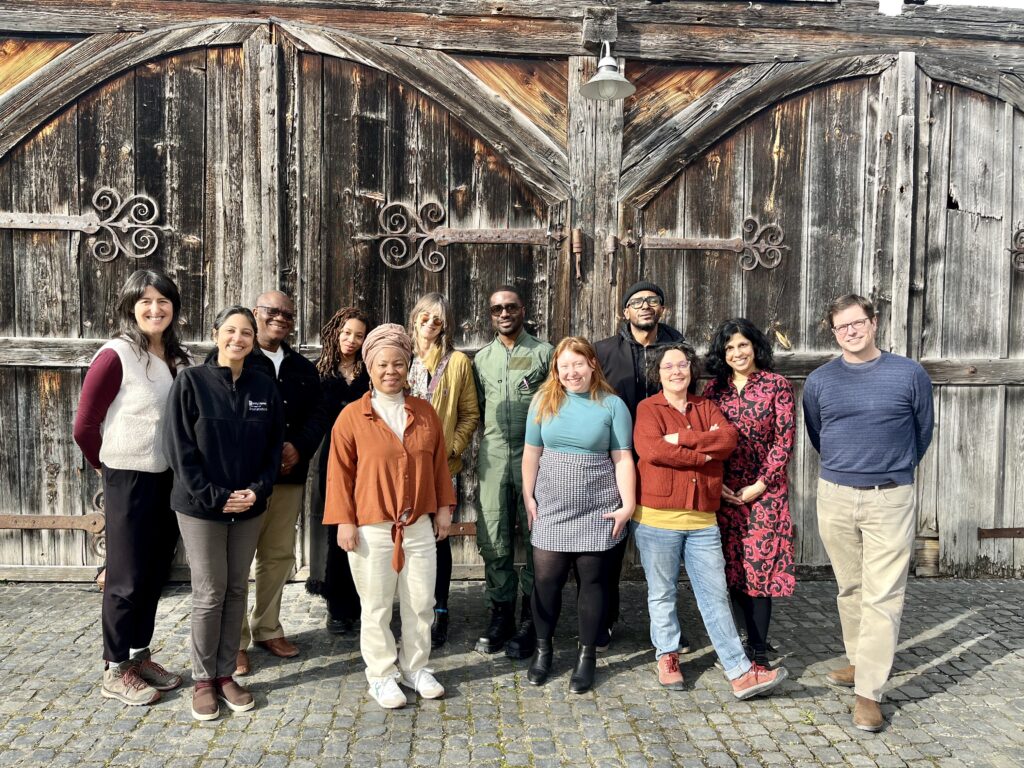AI as a Social Science
Date
Mar 7-13, 2025Organized by
Rumi Chunara and Michael RalphLocation
Kartause Ittingen, Warth, SwitzerlandParticipants
- Sareeta Amrute Parsons School of Design The New School , USA
- Donna Auston Wenner-Gren Foundation, USA
- Rumi Chunara New York University, USA
- Gabriella Coleman Harvard University, USA
- Lilly Irani University of California, San Diego , USA
- Nyla Jones Howard University, USA
- Jerry John Kponyo Kwame Nkrumah University of Science and Technology, Ghana
- Brandon Ogbunu Yale University, USA
- Gustav Peebles Socialantropologiska institutionen Stockholms universitet, Sweden
- Michael Ralph Howard University, USA
- Danilyn Rutherford Wenner-Gren Foundation, USA
ORGANIZER’S STATEMENT: The influence of AI continues to gain momentum in all levels of education and all facets of commerce. AI also shapes the broader political landscape like never before, in debates about one superpower’s influence versus another, in concerns about technology and supply chains, and even in terms of the platforms we use to cast our votes. As such, for many observers, it is only a matter of time until advanced computation, robotics, and other technologies deliver human society from challenges ranging from poverty and crime to health disparities. Meanwhile in recent years, scholars from within and beyond this field have demonstrated that AI is rife with bias in its research designs and implications leading to the emergent field of “Ethical AI” (or “Responsible AI”). These recent efforts to remedy the systematic biases of AI proceed with shared methodological commitments: studies still center on a hypothetical individual deciding from a menu of discrete options, facing discernable risks, who seeks to achieve a specific, desired outcome. Our symposium, instead, gathers anthropologists and other social scientists together with computer scientists to explore the practical implications of treating AI as a social science.
Artificial intelligence shares with anthropology a focus on human ingenuity but too often views it through the lens of prediction. AI has yet to engage in any sustained way with the field of anthropology, which takes as its point of departure how people use tools to navigate the world, and how people establish shared social conventions and norms. Anthropology is explicitly concerned with the discrepancy between how people narrate the world around them and how that world is structurally organized. Yet in recent decades, anthropologists have generally eschewed models for social organization that help people develop practical insights about the world around them as computer scientists have meanwhile proliferated modelling strategies.
If computer scientists can benefit from anthropologists in studying complex negotiations as a point of departure for understanding complicated social formations rather than the discrete individual, anthropologists can benefit from taking AI more seriously as a tool that can potentially enrich broad facets of the human experience. With a principled view of each field, however, we posit that a synergistic new science can unfold. Treating AI as a social science means shifting the focus from human cognition to the interdependence that structures human society and the social practices through which people transform it.
This symposium proposes a meeting of humanists and social scientists in productive deliberation with computer scientists to develop a science of artificial intelligence that is concerned with understanding human sociality in its breadth and wholeness, interrogating social practices and institutions, and examining social problems in the context of theories and methods that have been refined for the express purpose of understanding what makes each person and each social context unique as well as the characteristics diverse peoples and contexts share with others.
Instead of merely developing more palatable language for AI to suggest that it is now somehow more “ethical,” we are interested to transform how AI research questions and designs are conceptualized, drawing heavily from humanistic and social science theories and methods. The conceit of this symposium is that to realize its potential, AI must become a humanistic social science. Treating AI as a social science means developing a practical strategy for analyzing how people negotiate pragmatic challenges and navigate distinct geographies. Meanwhile, this meeting will enrich the work of humanists and social scientists who are too often dismissive toward AI, hastily jettisoning practical challenges in favor of a critique that lacks generosity. Instead, we seek to understand how AI can be transformed into a humanistic social science while preserving the technical repertoire that potentially permits practitioners to define, measure, and thus better understand pressing social problems. We also seek to understand how emergent fields of computational social science create further possibilities for cross-fertilization and collaboration, both in strategies of quantification and anthropological critiques of it.
Some people have suggested that coding is now as essential to social life as writing, and this insight is an apt metaphor for our convening. Once the preserve of an educated elite, human societies ultimately created opportunities for more people to thrive in part by teaching writing to more people and thus involving more people in the production of knowledge. We do not imagine that AI will diminish in its reach or significance any time soon, which means social scientists and humanists must develop a serious engagement with it. Our symposium makes a similar call to democratize AI to involve more people in generating pressing insights concerning the human condition.
